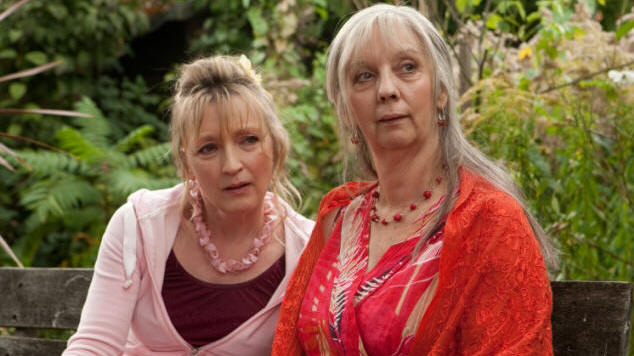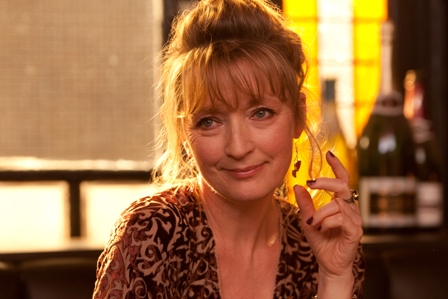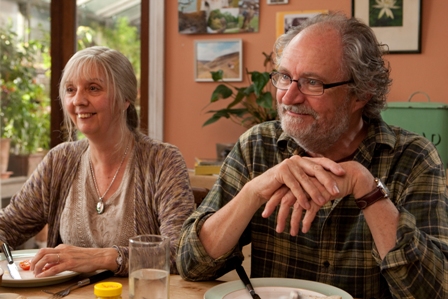
Friday, January 14, 2011
PHOTOS |
COMING SOON|
EXAMINER.COM FILM ARTICLES
||HOME
MOVIE REVIEW
Another Year
The Discreet Condescension
Of The...

Lesley Manville as Mary and Ruth Sheen as Gerri in Mike Leigh's "Another Year".
Sony Pictures Classics
by
Omar P.L. Moore/PopcornReel.com
 FOLLOW
FOLLOW
Friday,
January 14, 2011
Spring. Summer. Autumn. Winter. Seasons change.
People rarely do. Mike Leigh's "Another Year" is a four-act character
drama set over one calendar year in present-day England. Several friends
visit married couple Tom (a superb Jim Broadbent) and Gerri Bankhurst (an
excellent Ruth Sheen), both
at peace with the fullness of their lives. Edging towards retirement,
they are healthy, secure economically and empty-nesters, waiting for their only
child Joe (Oliver Maltman) to get married. Their friends Mary and Ken are among those
visiting.
The source of my endless fascination with "Another Year",
one of 2010's very best films,
is its seemingly benign married hosts, who are as vain and surface as the harsh
realities of their friends' situations allow them to be. Tom and Gerri
don't appear to have problems. But look closely: they
rarely pause for introspection even at opportune moments. (Note: Both will be
framed individually in mirrors during the film, mirrors they never comfortably
look in.) Gerri admits feeling guilty about Mary, yet her statement is
very casually if not superficially rendered. They, like some of us, imbibe
alcohol to secrete their discomforts and anxieties.
More interesting still: rarely are Tom and Gerri examined. In this very
subtle, carefully measured film they are the director's "presentation".
(They're doing "just fine", they gently insist.) Mary attempts to unearth
more about Tom and Gerri but to no avail. When they're probed again it's
by Katie (Karina Fernandez), a potential family addition, over dinner.
There, everyone finishes each other's sentences. It's as if Katie's been
family forever. ("Your son's a weirdo!" she says. By extension so are the son's parents.
The apple doesn't fall far from the tree -- in the very garden allotment Gerri,
Tom and Joe are seen digging around in.)
Jon Gregory's editing is appropriately fluid, bouncing through those
dinner table interactions. The same equanimity editing-wise is lent to a
later but different interaction between non-surrogate family members. Mr. Gregory's editing is one of the many great things about
"Another Year", especially in a scene involving Mary and Katie during the
"Autumn" portion of the film. Alternating between rapid cuts and lingering
shots -- all one-shot close-ups -- the level of tension is accentuated to the
point of unbearable.
Mary's life has her perpetually dangling off a cliff's edge. Drenched in
self-denial and loneliness, she drowns in drink and anecdotes of her
misadventures, "stories" possibly disguised as feeble attempts to be embraced as
a family member. She's a pathetic creature: truthful as a
representation, dishonest -- or perhaps more aptly, hypocritical -- as a personality.
Hurting? Like a maimed kitten.
Lesley Manville is extraordinary as Mary, who quietly hemorrhages emotionally.
Mary is awkward, devastatingly desperate and nail-bitingly needy. Ms.
Manville perfectly embodies "Mary, Mary, quite contrary". And just how
does her garden grow? (Mary is asked: "Are you going to do something about
your garden this year?", to which she replies: "I've neglected it, haven't I?")

Lesley Manville as Mary in "Another Year".
Sony Pictures Classics
Ms. Manville's portrayal of Mary may feel exaggerated for its own sake, but it
isn't. Deeper turmoil hides behind her mask. There's a
cutting, feral
nakedness to her character that bleeds out. She's as vulnerable as honey
about to be attacked by bees. The beauty of Ms. Manville's work is not
just in her keen awareness of her self-deception ("I don't really smoke", she declares
repeatedly), but the jarring looks conveying her pain while she searches for
truth in others. We ache with her, identifying with her more than with her
contemptible richer hosts. It's a powerful performance from Ms. Manville,
and her sensational comic timing makes Mary equally funny and unsettling.
With limited exception, Mr. Leigh's camera almost always views Mary remotely
when with others, accentuating her loneliness. Yet Mr. Leigh
typically eschews overly stylistic flourishes designed to manufacture audience opinion
or feeling; the well-acted character types (particularly Martin Savage as Carl)
invite us to sort things out.

Ruth Sheen and Jim Broadbent in "Another Year".
Sony Pictures Classics
Having seen "Another Year" multiple times, I simply couldn't let go of Tom and
Gerri. Both are troubled by Mary yet keep inviting her to visit, becoming
chronic enablers of Mary's dependence on them. Why? There's an immense
self-satisfaction and conceitedness about them. They're disarmingly polite
but condescending. There's a nobility about their condescension, a dignity
existing squarely within the off-handedness of their pitying observations.
There's pretention and high-minded contempt towards one guest. In contrast to their guests, much
between them is internalized. Even
so, Tom and Gerri are genuinely kind to their guests, but how do they
really feel about them? More importantly, how do they
view themselves through the prism of those who enter their home? These are
some of the major inquiries tugging at the heart of "Another Year".
And yet on repeated viewings I was sickened by these "nice" hosts. At
almost every turn Tom and Gerri gently patronize Mary, and by extension other
guests, typically members of the lower economic strata. There are knowing
glances of quiet judgment that punctuate silences and these are repeated,
becoming disconcerting.
Tom and Gerri -- Mr.
Leigh's not-coincidental names, like the cartoon characters -- are continual
caretakers of others but have little substantive conversation amongst
themselves. They've been married for 30 very good years. They talk
past each other but communicate in the shorthand that long-term spouses do.
Who do they talk to about their own issues and concerns?
("Everybody needs somebody to talk to", one character tells Gerri.) Early
on, there's revealing dialogue about geologists and their wives on the beach.
This speech arguably crystallizes who Tom and Gerri are. We hardly know
them. Removed, they emote very little at all, and might in some
professional circles be deemed unhealthy.
The director, who has looked at the contradictions of humans in numerous films
including "Secrets And Lies" and "Vera Drake", allows this "flawless" couple to
be a measuring stick for further dramatizations of (and emphases on) not-so
fortunate, more imperfect characters. Mr. Leigh, as he often does, resists
advertising characters' motivations, achieving maximum mileage from
improvisation. Are Tom and Gerri really that much different from their
friends? "Another Year" is so disciplined and pedestrian that it sneaks up
on you and drops a cold dose of reality in its final, haunting shot and fine
cinematography from Dick Pope, whose color tone changes correspond with the four
seasons.
"Another Year", a rich, organic, compassionate human drama, is about adults who are incapable of being honest with
themselves and others. There's an everyday pathology about the façades we
put up in an attempt to be socially polite. We generally resist the urge
to say what we truly think and feel publicly, but in safe company let fly with
our honest feelings and offenses. Are we being true to ourselves or betraying
ourselves when we do this? Is it better to just remain diplomatic and
self-contained, possibly bursting at the seams with pent-up angers and
irritations? Isn't it easier (and healthier) to vent? Tom and Gerri
struggle mightily with these issues, where other characters in the film do not.
It's far too easy and convenient to label "Another Year" as a pity party for poor old
Mary. I'm not sure the director wants it to be that easy for his
audiences.
Mr. Leigh inevitably forces us to think about all of his characters while
dressing them in tragicomic surroundings. "Another Year" is an
entertaining, often funny conversational piece. It's also a sobering and
unsettling experience (though I laughed more hysterically during the film's
"Winter" portion each new time I saw it.) Mr. Leigh isn't indicting his
characters; almost all are likable and well-developed, but the more we watch and
listen to them, the more we realize that the most suffocated and isolated people
are Tom and Gerri themselves. The truth is, they need help, and need these
troubled souls as much as the souls need them.
With: Peter Wight, Michele Austin, Imelda Staunton.
Note: You can also read this review
here (with a slideshow) at the S.F. Indie Movie
Examiner page.
"Another Year" is rated PG-13 by the Motion
Picture Association Of America for some language.
The film's running time is two hours and nine minutes.
 FOLLOW
FOLLOW
SUBSCRIBE TO THE POPCORN REEL MOVIE
REVIEWS RSS FEED
